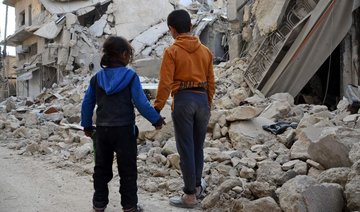DOHA/KUWAIT: More than $260 million has been pledged in humanitarian aid for Syria following a meeting in Doha on Sunday involving the UN and 25 non-governmental organizations from across the region.
Qatari state media said the total number of pledges stood at $262 million and were made by participants at the meeting which comes ahead of an EU two-day conference on war-torn Syria later this week in Belgium.
Ahmed bin Mohammed Al-Muraikhi, the UN secretary-general’s humanitarian envoy, told the Doha meeting that Syria faces a huge humanitarian crisis which requires up to $8 billion in aid for the current year. He added that more than 13 million Syrians need humanitarian assistance, according to the Qatar News Agency.
Among the organizations at the conference was the Qatar Red Crescent, several from the Gulf Cooperation Council and charities from Lebanon, Jordan and Turkey.
This week’s Brussels conference is expected to bring together representatives from more than 70 countries and international organizations. Qatar has been one of the biggest financial backers of opposition groups fighting Syrian President Bashar Assad.
Meanwhile, a senior UN refugee official said she saw little sign that the crisis would end any time soon.
Speaking during a visit to Kuwait to sign a $10 million aid agreement for Syrian refugees in Iraq, Kelly T. Clements, deputy commissioner for the UN High Commission for Refugees (UNHCR), said the UN body lamented the “sad” fact that the number of refugees fleeing Syria’s civil war had passed the 5 million mark.
“For us at UNHCR, we don’t celebrate these milestones. We in fact try not to bring a lot of attention to it because it is not a good story,” Clements told Reuters.
“It means basically that we haven’t seen a political solution to make it possible for people to go home safely and in dignity and voluntarily.”
Syrians have poured across their borders into Turkey, Lebanon, Jordan and Iraq since anti-government protests in 2011 descended into a full-blown conflict between rebels, militants, government troops and foreign backers. Clements said that apart from the 5 million refugees, there were some 13.5 million people who had been displaced inside Syria.
“They are not able to support their families. They are in harm’s way in terms of mortar shells ... They are not able to put their kids through school. Statistics we have show that a million-and-a-half kids inside Syria are out of school,” Clements said.

























